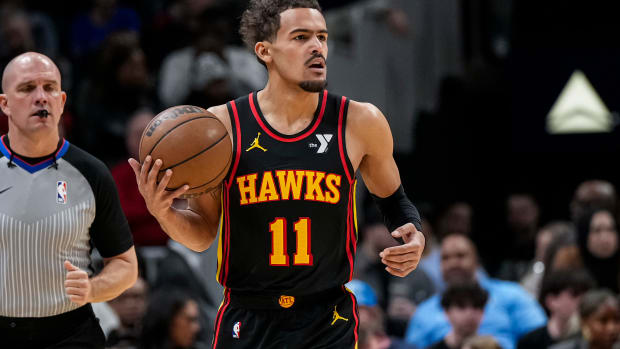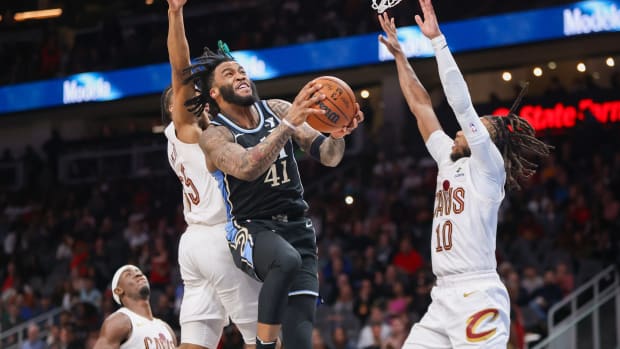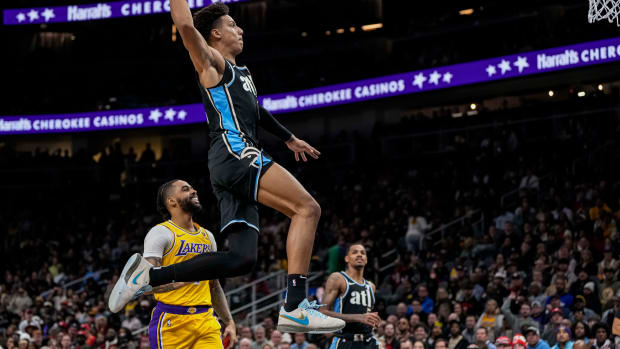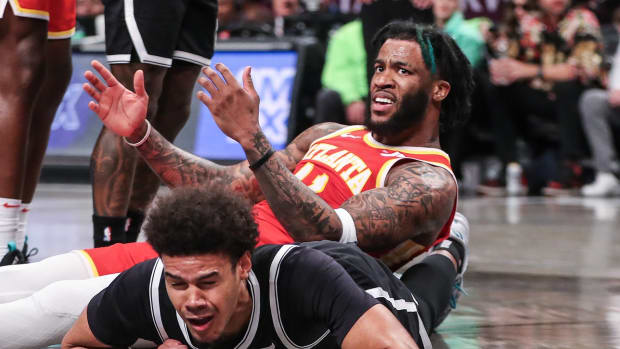Young, Giannis, and Other East All-Star Selections
The NBA is oriented, ultimately, around team success. We spend the better part of seasons speculating which groups have the best chances of winning the NBA title, while the teams themselves jostle with one another to put themselves in optimal position to make a run at a championship. The game’s great players are judged (usually unfairly) by how many rings they’ve won while role players are often evaluated by how much or little they might swing a playoff series.
But that team success is driven by individual players. It takes a collective effort to win a championship, but catalysts who contribute outsize value are necessary parts of that effort. We recognize these players with accolades like MVP, All-NBA, and, now that the voting deadline has passed, All-Star teams. Below are this website’s unofficial selections for this year’s rosters.
First, a word on the selection process:
Players are evaluated solely on the basis of their play on the court this season. Factors like reputation, popularity, and aesthetic appeal do not apply. Hall-of-Fame cases and contract incentives depend partly on All-Star appearances, and thus the media has an obligation to take the vote seriously. Though I’m not among the media with an official vote, I abide by the NBA’s positional designations, which means each roster has four frontcourt, six backcourt, and two wild-card spots. It should go without saying that fan voting isn’t taken into account.
We’ll begin with the Eastern Conference:
Starters
G Trae Young
G Ben Simmons
F Jimmy Butler
F Giannis Antetokounmpo
F Joel Embiid
Reserves
G Kemba Walker
G Kyle Lowry
F Pascal Siakam
F Bam Adebayo
F Khris Middleton
WC Jaylen Brown
WC Domantas Sabonis
Honorable Mention: Bradley Beal, Malcolm Brogdon, Tobias Harris, Eric Bledsoe, Spencer Dinwiddie
The Guards
I did not expect to settle on Young as a starter, and feel queasy doing so, but here we are. Any two-man combination of him, Walker, and Simmons would be acceptable, and I’m not interested so much in Young’s gaudy per-game numbers or innumerable highlights as his impact on Atlanta’s offense. Young remains a candidate for the worst defender in the league, but his offensive value easily tops that of any other guard in consideration. The Hawks are 13.8 points per 100 possessions worse on offense with Young off the floor (they have a comical 94.8 offensive rating when he sits) and his ability to create easy looks for his teammates is nearly unrivaled in the East. He’s hitting 37 percent of his 3-pointers on over nine highly difficult attempts per game and leads the conference in assists despite playing most of the year without an above-average 3-point shooter around him. Young carries by far the heaviest offensive load of any other guard in the conference and bends defenses as a shooter to a degree Walker and Simmons don’t.
Lowry’s defense, gravity, ball movement, and intelligence affect the game beyond his per-game numbers, and peak Lowry season earns him a starting spot. But that impact hasn’t quite shown up in the more advanced data the way it has in recent years. Walker is the clear primary engine on the league’s third-best offense, but Boston’s defense craters when he plays and he has superior surrounding talent than most players in the East.
I’m fascinated by a hypothetical swap of Young and Walker. What would Young look like with capable defenders and secondary playmakers around him, and the motivation that comes with being on a playoff team? Would he scale into a less ball-dominant role as seamlessly as Walker has? Could Walker singlehandedly keep Atlanta’s offense afloat? Which role is more valuable?
I understand penalizing Young for being on the worst team in the league, but it’s hard to pin much of it on him. His team was not constructed to win this season, and it’s only because he ascended so quickly that Atlanta’s flaws have been cast into such stark relief. He’s a major problem on defense, but he’s far from the biggest issue on that end. Elite offensive engines are the scarcest commodity in the league, and in a vacuum, that makes Young’ season slightly – slightly – more impressive than other deserving guards.
Some view Simmons’ lack of a jumper as a crippling detriment to both his value and the 76ers’ offense. While it is an obstacle and glaring weakness that makes it harder to fit other pieces around him, it doesn’t preclude Simmons from being an All Star or, eventually, an MVP candidate. He might be the most versatile defender in the NBA right now, and he remains one of the 10 best passers in the league – only LeBron James, Luka Dončić, and Ricky Rubio create more points via assists. Simmons is a terror in transition – an area the Sixers probably don’t exploit often enough – and Philly’s offense is better when he plays without Embiid than when the two play together or Embiid plays without Simmons (its defense and net rating are better in the opposite arrangement – a testament to Embiid’s defensive prowess).
The Frontcourt
The three starting frontcourt spots are virtual certainties. Perhaps no star does more grunt work than Butler, who has also been the catalyst of Miami’s offense. His individual efficiency is down, but the Heat offense runs almost nine points per 100 possessions more efficiently with Butler on the court, and he spares more limited players from having to shoulder too heavy a load. Giannis is currently the favorite to repeat as MVP, and there’s just aren’t many forces more imposing, when healthy, than a fully-engaged Embiid.
Had Siakam been healthier in the first half of the season, I’d have more strongly considered him as a starter, though Butler not being eligible as a guard would have made him tough to fit in. Adebayo was a lock on the second unit – there isn’t a more dynamic two-way center in the league and his versatility unlocks an otherwise limited Miami offense.
Don’t let Giannis’ dominance and Milwaukee’s depth obscure the fact that Middleton has had a career year on one of the most dominant regular-season teams in NBA history. He defends multiple positions, rarely makes mistakes, and provides necessary secondary creation around his MVP teammate. It’s hard to cut someone so versatile, so efficient, and so vital to a great team.
I question how Brown might fare on a team that asked him to carry a heavier playmaking load (as most teams would) but his defensive versatility and scoring at all three levels of the floor allows him to dominate in a relatively limited role. His downhill aggression and explosiveness makes him more dynamic than Jayson Tatum, who hasn’t been efficient enough on offense to make my ballot. Tatum is the better off-ball defender of the two, but Brown has more agility and versatility on the ball and is slightly more valuable to a good team than Tatum.
Beal has been an inefficient volume scorer on a bad team; Dinwiddie plays a similar role on a slightly better team; Bledsoe isn’t quite central enough on offense to make the cut and Brogdon hasn’t played enough minutes. Sabonis grades out better in most all-in-one metrics, and I rewarded him for anchoring a winning team as one of the league’s best dual-threat offensive centers.
Next up: The Western Conference.




